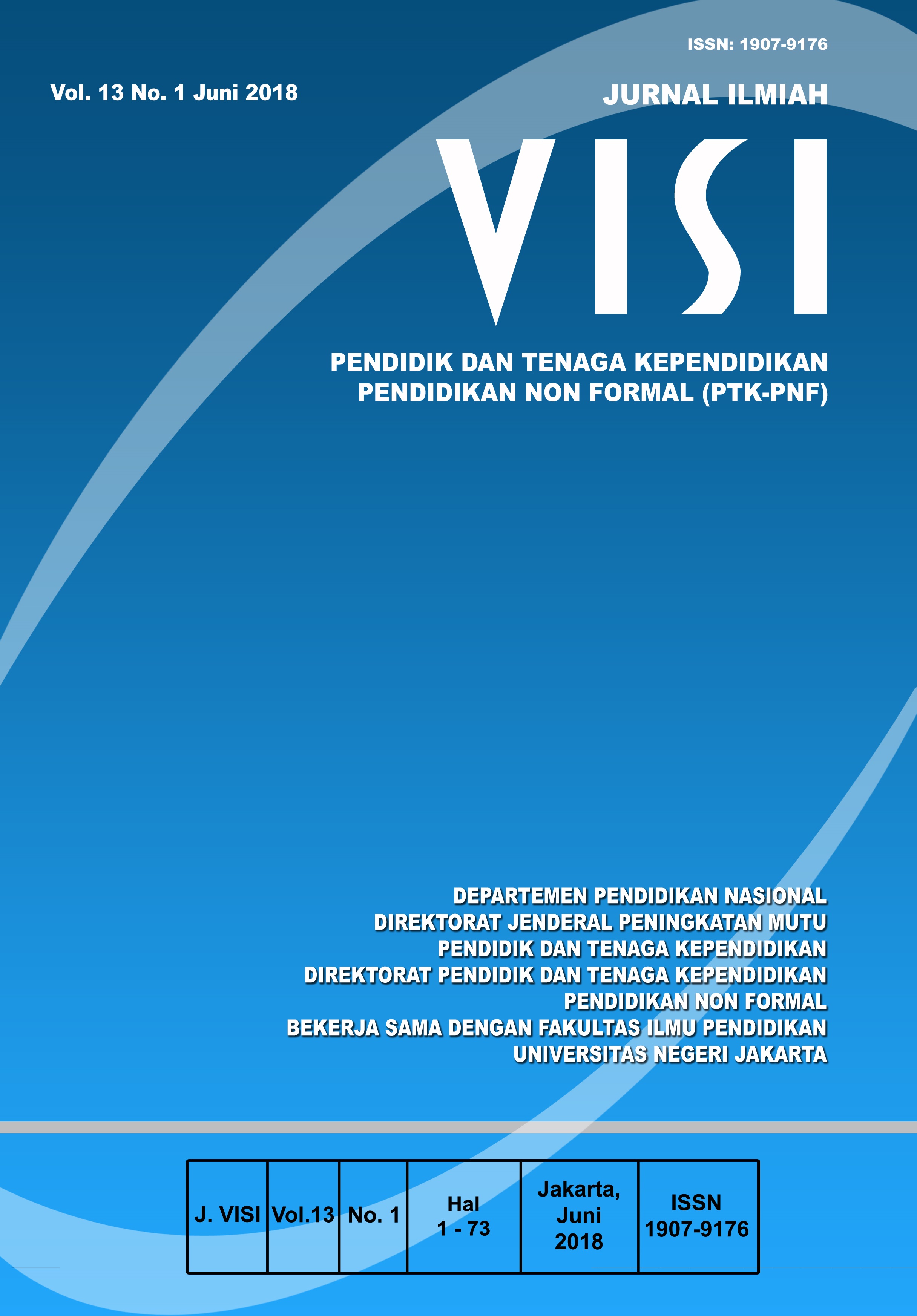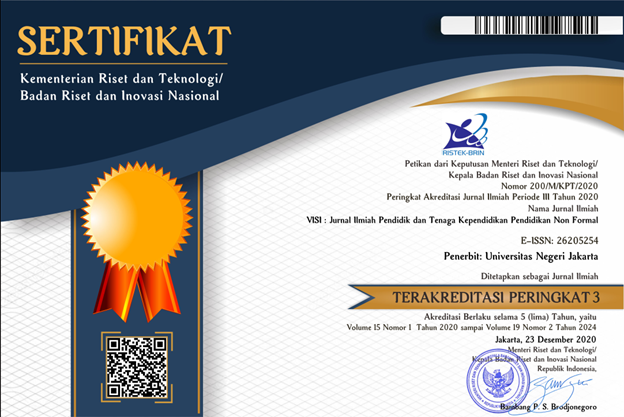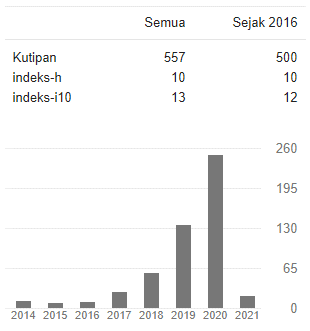NILAI KARAKTER, BERPIKIR KRITIS DAN PSIKOMOTORIK ANAK USIA DINI
DOI:
https://doi.org/10.21009/JIV.1301.4Keywords:
character values, critical thinking, psychomotor, early-childhoodAbstract
The research was distributed by the facts on the ground about the condition during the process of the achievement of early-childhood education that is not optimal. The process of educational achievement in question is the value of a character, critical-thinking ability and psychomotor early childhood. This research was conducted to find out the condition of the development of the value of the character, critical thinking and psychomotor children aged 5-6 years. This research uses survey method. The subjects for the students involved are early-childhood kindergarten Nurul Ilmi and TK Negeri Pembina. The number samples of this research in the study as many as 40 people. Long research conducted about two months. Instrument in this study using structured observation and documentation. The results from this study indicate that the profile of the value of the character, critical thinking and psychomotor children aged 5-6 years in kindergarten Nurul Ilmi Tasikmalaya and TK Negeri Pembina Tasikmalaya results still do not match expectations. This is apparent in the findings in kindergarten Nurul Ilmi that profile the value of character of 50.06%, critical thinking of 49.80% and psychomotor 50.87%. Whereas in TK Negeri Pembina character value profile of 51.22%, critical thinking of 50.98% and psychomotor 52.17%. Based on these findings, it is hoped all components in school, especially teachers can improve performance in order to optimize the potential of learners.
References
Ali, M. (2011). Memahami riset perilaku dan sosial. Jakarta: Bumi Aksara.
Ardiyansyah, E.C.A., (2012). Pengaruh permainan tradisional terhadap peningkatan keterampilan
sosial anak prasekolah. Disertasi. Surabaya: UIN Sunan Ampel Surabaya.
Bloom, B. S. dkk. (1956). Taxonomy of educational objectives. New York: David McKay.
Ennis, R.H. (2011). The nature of critical thinking: An outline of critical thinking dispositions and disabilities. Sixth International Conference on Thinking at MIT Cambridge. Diakses melalui
http://faculty.education.illinois.edu/rhennis/documents/TheNatureofCritical
Thinking_51711_000.pdf
Geldard, K. & Gerald, D. (2012). Konseling anak-anak. Jakarta: Indeks.
Hurlock, E. B. (2012). Psikologi perkembangan. Jakarta: Erlangga.
Judiani, S. (2010). Implementasi pendidikan karakter di sekolah dasar melalui penguatan pelaksanaan kurikulum. Jurnal Pendidikan dan Kebudayaan, 16(9), 280-289. doi: http://dx.doi.org/10.24832/jpnk.v16i9.519
Nurihsan, A. J. & Agustin, M. (2011). Dinamika perkembangan anak dan remaja. Bandung: Refika Aditama.
Permendikbud Nomor 137 Tahun 2014 tentang Standar Nasional Pendidikan Anak Usia Dini
Purnama, S. (2016). Materi-materi pilihan dalam parenting education menurut Munif Chatib. Jurnal Ilmiah Tumbuh Kembang Anak Usia Dini, 1(1), 1-16. http://ejournal.uin-suka.ac.id/tarbiyah/index.php/goldenage/article/view/1245
Rakhmat, C. & Solehuddin, M. (2006). Pengukuran dan penilaian hasil belajar. Bandung: Andira.
Rakhmat, C., Budiman, N., & Herawati, N. I. (2008). Psikologi pendidikan. Bandung: UPI Press.
Santrock, J. W. (2007). Perkembangan anak. Jakarta: Erlangga.
Saputri, N.I. (2014). Upaya meningkatkan kemampuan berpikir kritis siswa kelas V melalui inkuiri terbimbing. Skripsi. Yogyakarta: Universitas Negeri Yogyakarta.
Sudaryanti. (2012). Pentingnya pendidikan karakter anak usia dini. Jurnal Pendidikan Anak, 1(1), 11-20. https://journal.uny.ac.id/index.php/jpa/article/view/2902
Sugiyono. (2012). Metode penelitian kualitatif, kuantitatif, dan R&D. Bandung: Alfabeta.
Sujiono, Y. N. (2009). Konsep dasar pendidikan anak usia dini. Jakarta: Indeks.
Syaodih, E. dan Agustin, M. (2013). Penelitian bidang keilmuan: Penerapan permainan tradisional “Kaulinan Barudak†untuk mengembangkan nilai karakter anak. Bandung: UPI.
Van de Waal, D. & Henriette, A. (1993). Environmental factors influencing growth and pubertal development environmental factors influencing growth and pubertal development. Amsterdam: Department of Pediatrics, Free University Hospital.
Yusuf. LN., S. (2012). Psikologi perkembangan anak & remaja. Bandung: Remaja Rosdakarya.
Downloads
Published
How to Cite
Issue
Section
License
Authors who publish with this Journal agree to the following terms:
- Author retain copyright and grant the journal right of first publication with the work simultaneously licensed under a creative commons attribution licensethat allow others to share the work within an acknowledgement of the work’s authorship and initial publication of this journal.
- Authors are able to enter into separate, additional contractual arrangementfor the non-exclusive distribution of the journal’s published version of the work (e.g. acknowledgement of its initial publication in this journal).
- Authors are permitted and encouraged to post their work online(e.g. in institutional repositories or on their websites) prior to and during the submission process, as it can lead to productive exchanges, as well as earlier and greater citation of published works.
- Users/public use of this website will be licensed to CC BY-NC-SA Creative Commons Attribution-NonCommercial-ShareAlike 4.0 International License









